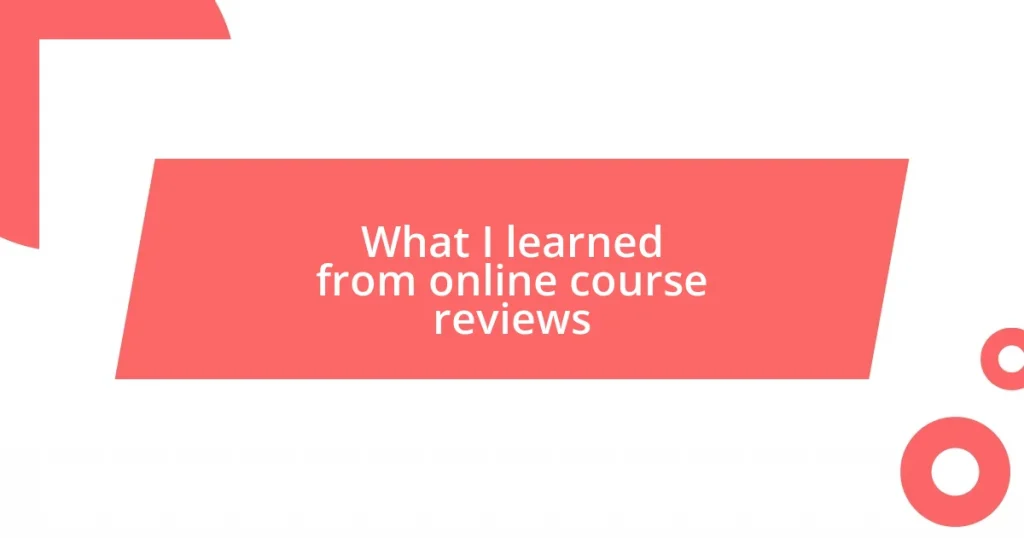Key takeaways:
- Course reviews provide authentic insights into learning experiences, highlighting both strengths and potential pitfalls, helping learners make informed decisions.
- Common themes in reviews, such as quality of course materials, instructor availability, and community engagement, significantly influence the overall learning experience.
- Evaluating the credibility of reviews and considering context, emotional tone, and timing is crucial for aligning personal learning goals with suitable courses.
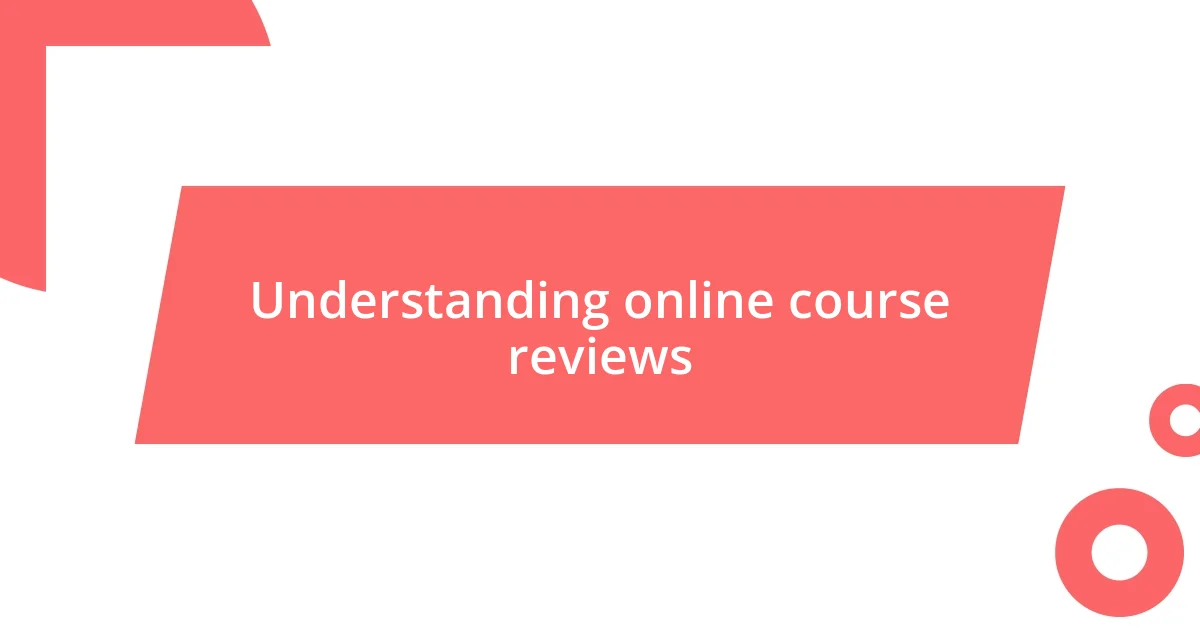
Understanding online course reviews
When I first started exploring online course reviews, I was struck by the vast array of opinions and experiences shared by learners. It made me wonder, how could such diverse perspectives shape my own decisions? Engaging with these reviews felt like sitting around a virtual campfire, listening to stories that could illuminate the path I was about to take.
I remember reading a particularly candid review where someone described feeling overwhelmed by the course material but also highlighted the support from the instructor. That duality struck a chord with me. It’s essential to recognize that experiences can vary widely; while one student may thrive in a challenging environment, another might find it stressful. Isn’t it fascinating how a single course can evoke such different reactions?
Online course reviews serve as a rich tapestry of insights, blending reassurance with caution. They can reveal not only the strengths of a course but also its potential pitfalls. The emotional highs and lows captured in these reviews made me realize how our individual learning journeys are deeply personal. After all, which factors truly matter to you when choosing a course?
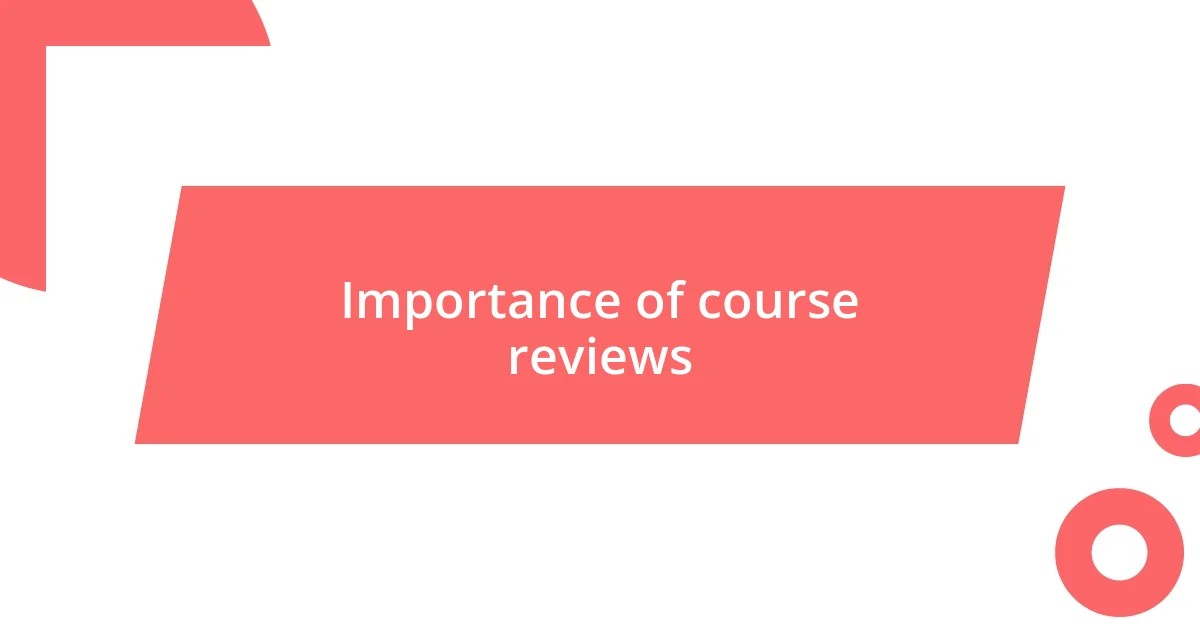
Importance of course reviews
Course reviews are invaluable resources for anyone diving into the world of online learning. They provide authentic insights from fellow learners, shedding light on course dynamics and instructor styles that you often can’t find in promotional material. I remember coming across a review that detailed how the instructor’s engaging teaching style transformed a mundane topic into something truly exciting—an experience I later found mirrored in my own courses.
Here are a few key reasons why course reviews matter:
- Authenticity: They reflect real student experiences, giving you a clearer picture of what to expect.
- Diverse Perspectives: Reviews often highlight varying opinions, which can guide you in choosing a course that aligns with your learning style.
- Warning Signs: Negative feedback can serve as red flags, helping you avoid courses that may not meet your expectations.
I’ve witnessed how these insights can significantly impact our learning choices. Once, after reading a series of enthusiastic reviews about a particular course, I was convinced it was the right fit for me. The passion of past students was contagious, convincing me to take the plunge. Overall, course reviews are not just helpful; they are essential for making informed decisions in the expanding landscape of online education.
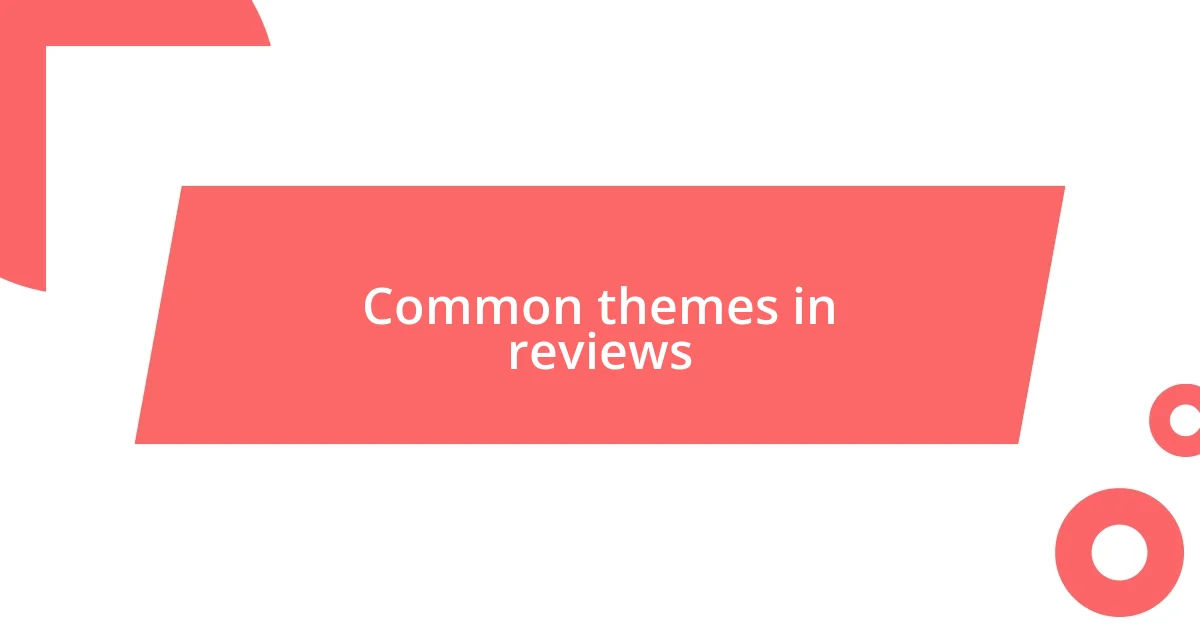
Common themes in reviews
Online course reviews often revolve around a few recurring themes that resonate with many learners. One of the most common points highlighted by reviewers is the quality of the course materials. I’ve often seen comments about how organized and up-to-date the resources are, which is crucial for a seamless learning experience. For instance, I once enrolled in a program where the downloadable resources were not only comprehensive but also relevant, making studying a joy rather than a chore. This consistency in quality can make or break a learning journey.
Feedback regarding instructor availability is another prevalent theme. Many reviews express how accessible and supportive instructors are throughout the course. Reflecting on my own experiences, I’ve found that having an instructor who is responsive can be a game changer. I recall a time when I had a pressing question late at night, and to my surprise, my instructor got back to me almost immediately. That level of engagement not only answered my question but motivated me to dive deeper into the course material, enhancing my understanding significantly.
Finally, reviewers frequently discuss the community aspect of the course. Engaging with fellow learners can lead to a richer experience. I remember feeling energized after participating in discussion forums where peers shared their insights and questions. This collaborative atmosphere made me feel like I was part of a learning family, which I hadn’t anticipated before enrolling. These shared experiences often end up being as valuable as the lessons themselves.
| Theme | Example from Reviews |
|---|---|
| Quality of Course Materials | Comments about organization and relevance enhancing the learning experience. |
| Instructor Availability | Feedback on responsive and supportive instructor interactions. |
| Community Engagement | Reflections on collaborative environment enhancing motivation and understanding. |
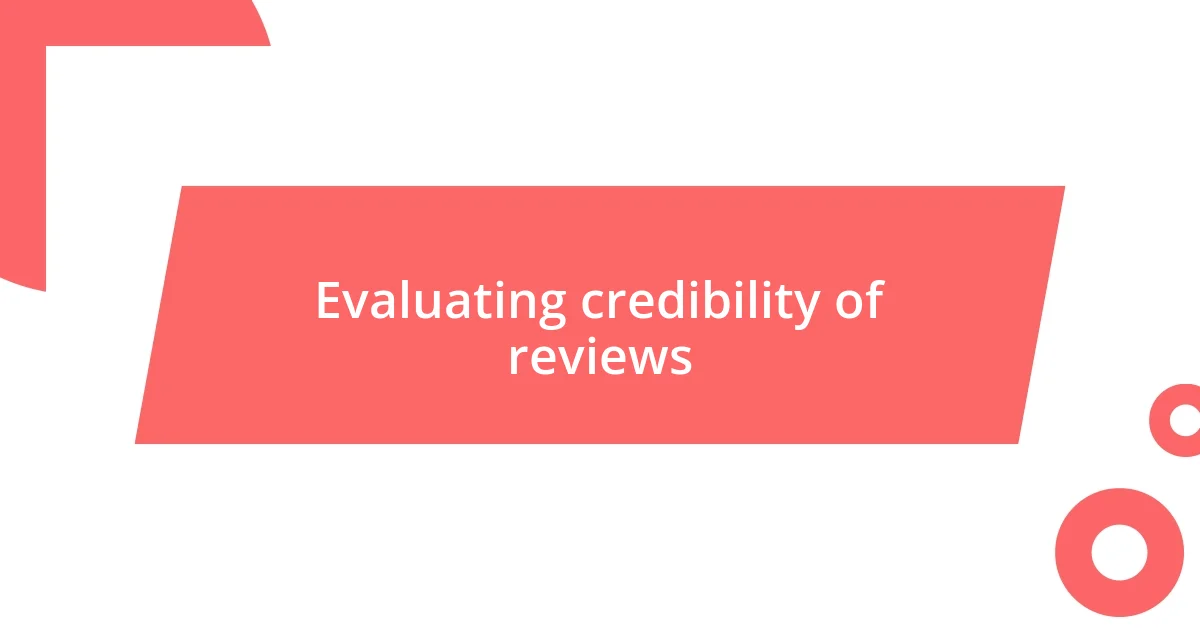
Evaluating credibility of reviews
When evaluating the credibility of course reviews, it’s essential to consider the source. I often take a moment to scroll through the reviewer’s profile to see their history and other reviews. Have they reviewed multiple courses in the same subject area? Their expertise can add weight to their opinions, making them more trustworthy in my eyes.
Another key aspect is the language used in the reviews. If a review is overly emotional or filled with vague statements, I tend to approach it with caution. I remember reading a glowing review where the writer seemed almost too enthusiastic—almost as if they were paid to write it. This raised a red flag for me, prompting me to seek out more balanced opinions to get a clearer picture.
Lastly, I pay close attention to the overall consensus in the reviews. If a significant majority aligns on specific points, I find that compelling. For instance, when numerous learners highlighted the practical applications taught in a course, that caught my interest. It felt reassuring to see a pattern emerge from diverse voices, guiding me toward making more informed decisions in my own learning journey.
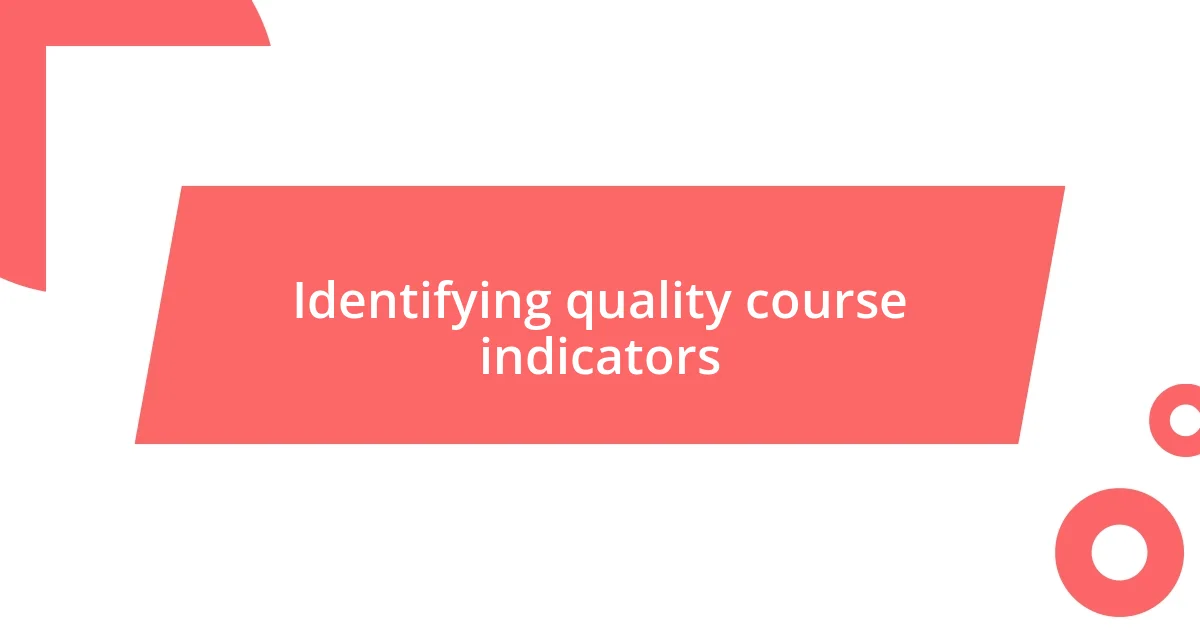
Identifying quality course indicators
Identifying quality course indicators is often about recognizing specific signs that reflect a well-designed learning experience. For example, I once found myself enrolled in a course that not only had comprehensive modules but also provided regular quizzes that reinforced learning. It struck me how much those small assessments helped clarify complex concepts; I realized that quality indicators often stem from a course’s ability to engage learners actively. Isn’t it fascinating how even the format of assessments can reveal a lot about a course’s commitment to effective learning?
Additionally, I pay close attention to the diversity of instructional methods employed within a course. A well-rounded course should offer a mix of videos, readings, and hands-on projects. I recall a digital marketing class that utilized various media—webinars, case studies, and interactive assignments—making the content come alive. This approach helped me solidify my understanding while keeping the learning process vibrant and engaging. Doesn’t a dynamic blend of resources just make you look forward to each lesson?
Lastly, I’ve learned that the extent of learner support offered is a significant indicator of a quality course. When I enrolled in a coding bootcamp, the availability of weekly office hours and one-on-one feedback truly set the experience apart. Knowing help was just an email away gave me immense confidence as I tackled challenging material. Have you ever felt that sense of security knowing your instructor is there for you? I certainly cherished every moment of that support, as it turned my nervousness into excitement for learning.
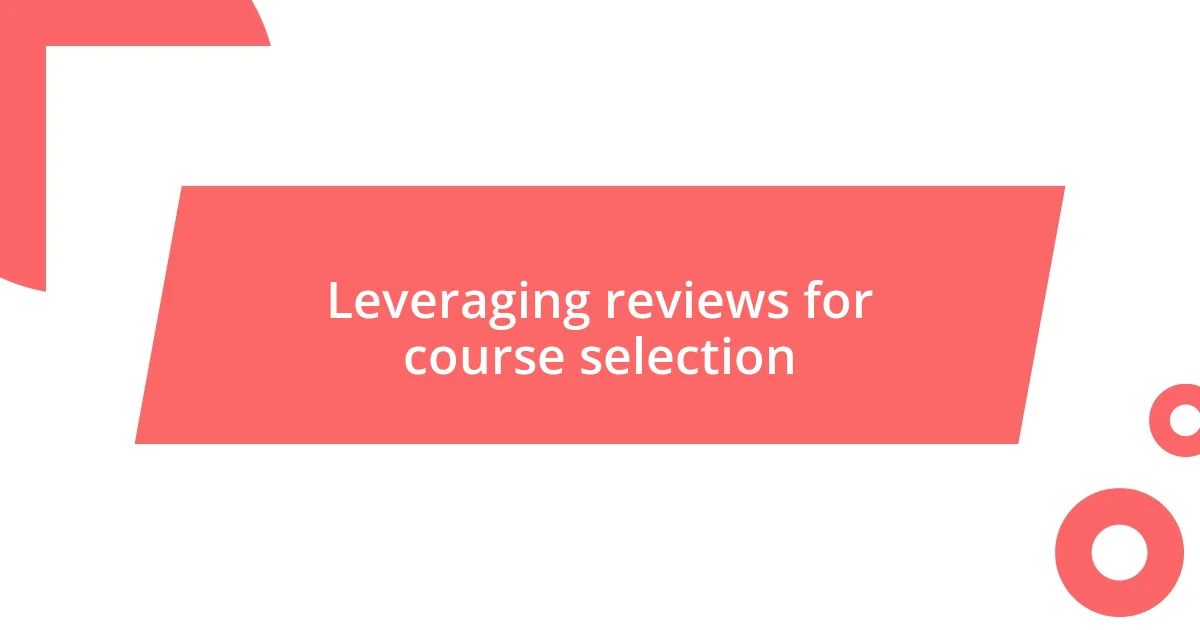
Leveraging reviews for course selection
Harnessing the power of course reviews can significantly streamline my selection process. I’ve found that looking for recurring themes across multiple reviews can tip the scales in favor of a course. For example, when browsing reviews for a data science program, I noted that many learners raved about the instructor’s ability to simplify complex topics. That feedback fundamentally changes my perspective on whether to enroll—after all, a supportive instructor can make or break the learning experience.
I also look out for specific criticisms mentioned in reviews, as they often provide insight into what I can expect. I remember reading about a communication skills course where several participants pointed out a lack of practical exercises. Initially, I was intrigued, but hearing those concerns made me reassess my priorities. If I’m investing time and money, I want to ensure that I gain hands-on practice, not just theory. Isn’t it vital that a course fully aligns with our learning goals?
Furthermore, I consider the emotional tone of reviews. One time, while researching a graphic design course, a review struck a chord with me—it described the transformation the reviewer experienced and mentioned how invigorating the community was. I could almost feel the energy and excitement in their words. That emotional resonance made me curious about the course and its environment. It’s remarkable how much personality can come through in a review, shaping my expectations and excitement for the learning journey ahead.
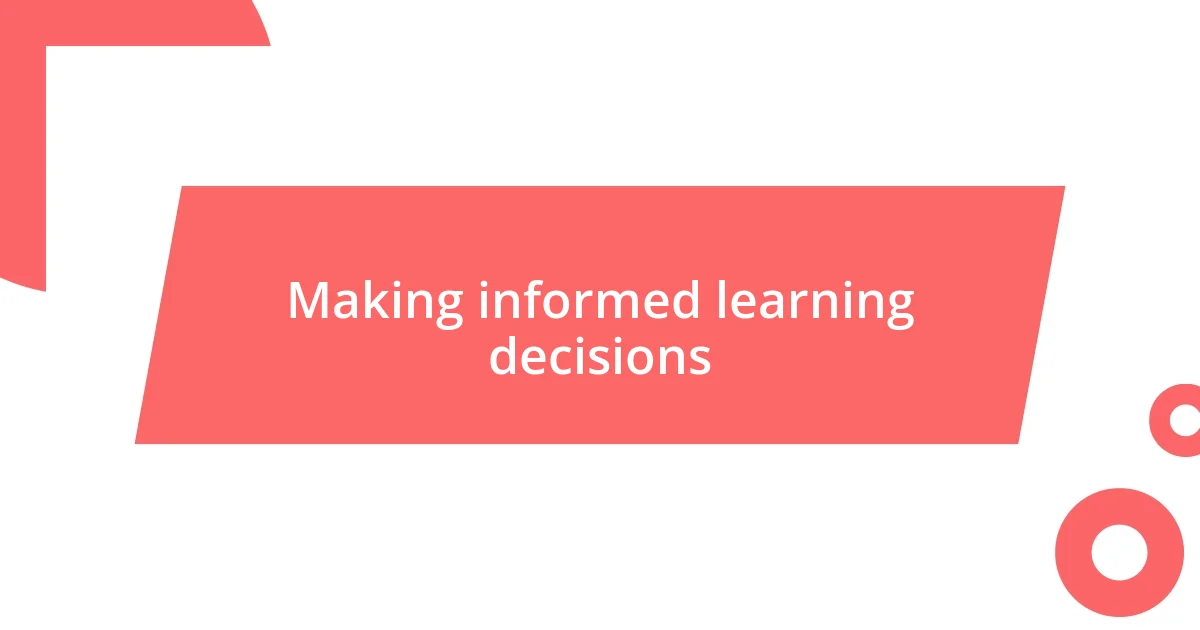
Making informed learning decisions
Making informed learning decisions requires a careful analysis of course reviews to align your personal goals with what a course offers. When I first started exploring online courses, I stumbled upon a coding class that had an overwhelming number of positive reviews. One particular comment about the instructor’s knack for breaking down intricate concepts into bite-sized pieces caught my interest. I thought, if their teaching style made such a significant difference for others, could it do the same for me? The answer was a resounding yes—my learning experience was enriched because I chose wisely based on what others had shared.
Another aspect I’ve discovered is the importance of context in reviews. I remember reading a glowing review about an entrepreneurship course, but the reviewer noted they were already somewhat experienced in the field. While their insights were valuable, I couldn’t help but wonder: would a beginner like me feel overwhelmed? This made me realize how crucial it is to consider my own level of knowledge and experience when absorbing feedback. I began to seek out reviews from individuals who were on a similar learning journey, emphasizing the need for relatable perspectives in making my decision.
Lastly, I’ve come to appreciate how the timing of feedback can shape the relevance of a course review. In one instance, I read a review from a student who had taken a beloved graphic design course a few years back. They shared how the curriculum had adapted over time to include the latest design software and trends. This made me reflect: is the course keeping pace with industry changes? It’s fascinating how the evolution of course content can greatly influence my learning outcomes. Have you ever felt the pull of a course only to realize it may not stay current? This awareness ultimately safeguarded my time and investment, ensuring I made informed decisions that would serve my long-term growth.










